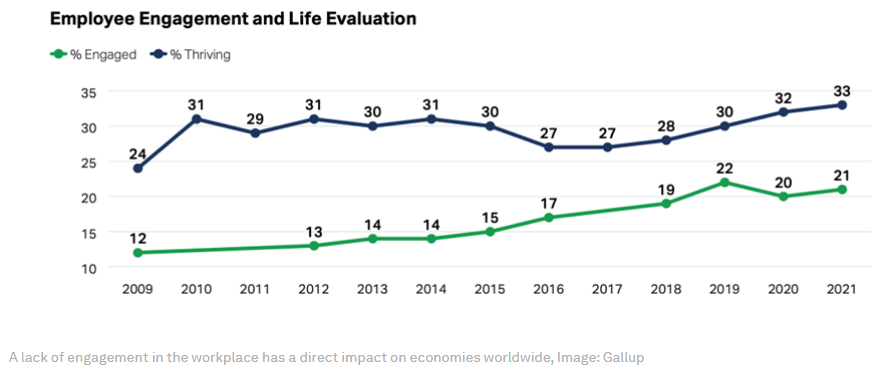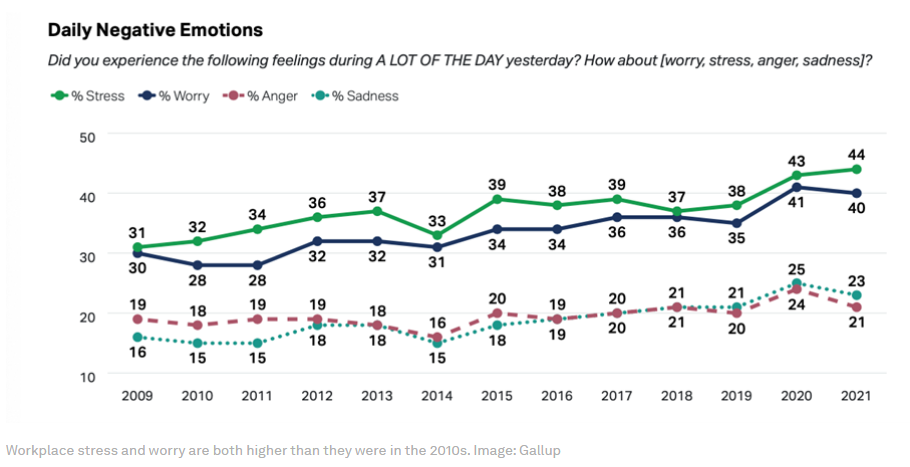by Mark McCord*
Workers around the world are feeling stressed and disengaged, according to a report that finds workplace well-being and satisfaction have plateaued after almost a decade of improvements.
About 60% of employees felt emotionally detached from their jobs last year, while almost a fifth described their time at work as miserable, says Gallup’s annual State of the Global Workplace report. COVID-19 is partly to blame, but other factors include long hours and bad experiences in workplaces.
The results have reinforced calls for employers to rethink their approach to employee well-being, especially after the pandemic exposed the emotional and physical vulnerabilities the modern workplace presents.
Impact of workplace experiences on employee well-being
“Improving life at work isn’t rocket science, but the world is closer to colonizing Mars than it is to fixing the world’s broken workplaces,” Gallup CEO Jon Clifton wrote in the report. “Executives everywhere should want the world’s workers to thrive. And helping the world’s workers thrive starts with listening to them.”
Here are the six key findings from the report.
1. Employee well-being stalling globally
While global employee well-being rose slightly compared with 2020, it remained below pre-pandemic levels and was still low. Just 21% of respondents said they felt engaged in their jobs and 33% said they were thriving in their overall well-being.
A lack of engagement in the workplace has a direct impact on economies worldwide, separate analysis by Gallup shows. The resulting reductions in productivity, staff retention and profitability costs the world economy $7.8 trillion, it estimates – that’s equivalent to 11% of global GDP.

2. Workplace stress on the rise
Stress levels among workers rose for a third year in a row, with 44% of respondents saying they’d felt stressed on the day before the survey. This is an all-time high for Gallup’s reports.
Feelings of worry edged lower, but remained higher than for any of the previous 10 years. The same was found for anger.

People admitting negative emotions may not have been led to feel that way by their jobs, the report notes, but adds that they still felt this way while at work.
3. Worker satisfaction slumps in South Asia and Europe
Employees in South Asia had the lowest well-being score for those in any region, with just 11% of people in Afghanistan, Bangladesh, India, Nepal, Pakistan and Sri Lanka saying they were thriving at work.
This was down by 5 percentage points on the year – a decline matched only by Europe. And people in both regions not only felt that their work life was worse than a year earlier, but were less optimistic about how things would be in five years’ time.
4. Positive on employment prospects in North America
Things are very different on the other side of the world, with North American workers feeling better about their job prospects than anyone else.
The US and Canada topped the survey for employee engagement and job opportunities, and were second globally for well-being and living comfortably.
5. Swings in optimism around job opportunities
While 45% of the world’s employees said it was a good time to find a job – a slight rise from 2020 – a far higher percentage of Americans and Canadians felt that way. A total of 71% said they were confident about the jobs market, up from 27% a year earlier.
Workers felt least optimistic about job opportunities in the Middle East and North Africa – just 28% thought it was a good time to be looking for work – and in East Asia, where the figure stood at 27%.
6. Work-life balance becoming blurred
As remote work has increased over the past two years, the division between work and home life has also become less defined.
Employees who regularly feel burnt out in their workplace say they have problems fulfilling family responsibilities, the report says. This can also lead to increased health problems.
All of this means that employers need to change the way they think, the report concludes. “Leaders need to add well-being measurements to their executive dashboards,” it says. “This can alert them to critical warning signs that do not show up on traditional spreadsheets.
“When leaders take responsibility for the well-being of their workers, the result is not only productive organizations, but thriving individuals, families and communities.”
How to make the workplace better
The findings dovetail with those of The Good Work Framework by the World Economic Forum, which seeks to encourage employers to foster a greater sense of belonging and to safeguard well-being within the workplace.
The framework lists five key ingredients for a better working life:
-Fair pay and social justice.
-Flexibility and protection.
-Health and well-being.
-Diversity, equity and inclusion.
-Employability and the creation of a learning culture.
The pandemic has provided employers with an opportunity to “redesign their people processes and work practices”, the report adds. “Seizing this opportunity will determine whether the post-pandemic recovery leads to positive outcomes for both business and for society at large, and ensures a healthy, resilient and equitable future of work.”
*Writer, Formative Content
**first published:www.weforum.org




 By: N. Peter Kramer
By: N. Peter Kramer
